Today was the 2015 Association for Mormon Letters Conference. It was a ton of fun, and also thought-provoking and literary and horizon-expanding and whatever else it is we’re supposed to be accomplishing. I personally left with some new ideas to play with, some new live faces to names I’ve known only through online spaces, and a long prospective reading list of interesting Mormon books for myself and my daughter.
We’ll do our best to get recording of the sessions posted on the Mormon Artist podcast shortly so that people from a distance can participate retroactively. Hopefully, in the future we’ll get more organized and get a live broadcast going.
Below are the full citations for the 2014 AML Awards (with the exception of a couple that will be forthcoming). The finalists and award winners are chosen by panels of judges knowledgeable in the categories. Last year no awards were given in Criticism, Poetry, and Short Story. To make up for this, works from both 2013 and 2014 were considered for the Criticism award, and two separate awards, one each for 2013 and 2014, were awarded for Poetry and Short Story.
Honorary Lifetime Membership
 The Lifetime Membership Award honors individuals who have given Mormon Literature sustained attention and service over their careers. The Association for Mormon Letters is pleased to have Karen Rosenbaum and Lance Larsen join the ranks of its honorary lifetime members. Karen is a veteran of Mormon
The Lifetime Membership Award honors individuals who have given Mormon Literature sustained attention and service over their careers. The Association for Mormon Letters is pleased to have Karen Rosenbaum and Lance Larsen join the ranks of its honorary lifetime members. Karen is a veteran of Mormon  letters since its Renaissance in the 1960s, who has served the community as a writer, a teacher, and an editor. Lance is a poet who has brought an impressive professional discipline to his career as a writer, teacher, and to his service as the state’s poet laureate. Please see this link for their full citations and bibliographies.
letters since its Renaissance in the 1960s, who has served the community as a writer, a teacher, and an editor. Lance is a poet who has brought an impressive professional discipline to his career as a writer, teacher, and to his service as the state’s poet laureate. Please see this link for their full citations and bibliographies.
Smith–Pettit Foundation Award for Outstanding Contribution to Mormon Letters:
 The Smith-Petitt Foundation Award, which also honors longstanding contribution to Mormon Letters, was awarded to Margaret Blair Young on Thursday for her individual efforts and for her contributions to collaborative projects. See this post for her citation and bibliography.
The Smith-Petitt Foundation Award, which also honors longstanding contribution to Mormon Letters, was awarded to Margaret Blair Young on Thursday for her individual efforts and for her contributions to collaborative projects. See this post for her citation and bibliography.
Comics: iPlates, Volume 2: Prophets, Priests, Rebels, and Kings, by Stephen Carter and Jett Atwood
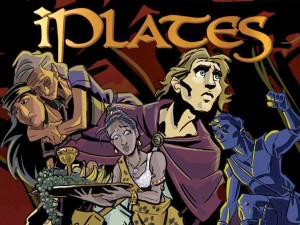 With their second book-length treatment of the Book of Mormon, writer Carter and artist Atwood have settled into their voice, a mix of scriptural language, pop-culture references, and high and low humor. Choosing which scriptural characters to focus on, and providing them with foils both scriptural and fully fictional, their recreation of both the growing corruption and burgeoning hope surrounding the fall of King Noah and the rise of Alma as a spiritual leader allows for good characters to make horrible errors in judgment and ambivalent characters to attain to moments of heroism. The simplicity of the story combined with the challenging ambiguities of the characters—overlaid with a gilding of silliness—makes iPlates ideal for intergenerational sharing, as readers both young and old find can aspects of the story that speak directly to them.
With their second book-length treatment of the Book of Mormon, writer Carter and artist Atwood have settled into their voice, a mix of scriptural language, pop-culture references, and high and low humor. Choosing which scriptural characters to focus on, and providing them with foils both scriptural and fully fictional, their recreation of both the growing corruption and burgeoning hope surrounding the fall of King Noah and the rise of Alma as a spiritual leader allows for good characters to make horrible errors in judgment and ambivalent characters to attain to moments of heroism. The simplicity of the story combined with the challenging ambiguities of the characters—overlaid with a gilding of silliness—makes iPlates ideal for intergenerational sharing, as readers both young and old find can aspects of the story that speak directly to them.
Creative Nonfiction: Hemingway on a Bike by Eric Freeze. University of Nebraska Press.
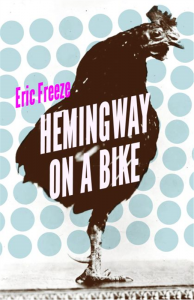 Riding shotgun with a teenage Vulcan in Canada, hitchhiking through France, and in the middle of the home improvement store parking lot in the middle of America, Eric Freeze offers fragments of his life in a collection of essays. Each one, a mosaic: odd experience, playful obsession, tender intrigue. Ideas and experiences are stacked together, layered as bricks, but without any obvious mortar; Freeze leaves the absences and the work of connecting them to the reader. “The deliberate choice to make those omissions is openly owned by the author, and he executes them with clean, fresh text and a gracious amount of reality about life in action and reaction, and multiplicity in meaning and meanings. Hemingway on a Bike is a bright, fresh light among Mormon writing; more creative, inventive and thoughtful than the whimsical title belies. ” Yet, the strange positioning of the hulking Hemingway on a trim French racing bike, does well to introduce the bemusing peculiarity of opportunities and observations fractured in a life. How they are stacked together, brought together into consideration, with rapt attention to association and absences alike that in the end push them forward to a present, that is, as Hemingway on a Bike is, fine art.
Riding shotgun with a teenage Vulcan in Canada, hitchhiking through France, and in the middle of the home improvement store parking lot in the middle of America, Eric Freeze offers fragments of his life in a collection of essays. Each one, a mosaic: odd experience, playful obsession, tender intrigue. Ideas and experiences are stacked together, layered as bricks, but without any obvious mortar; Freeze leaves the absences and the work of connecting them to the reader. “The deliberate choice to make those omissions is openly owned by the author, and he executes them with clean, fresh text and a gracious amount of reality about life in action and reaction, and multiplicity in meaning and meanings. Hemingway on a Bike is a bright, fresh light among Mormon writing; more creative, inventive and thoughtful than the whimsical title belies. ” Yet, the strange positioning of the hulking Hemingway on a trim French racing bike, does well to introduce the bemusing peculiarity of opportunities and observations fractured in a life. How they are stacked together, brought together into consideration, with rapt attention to association and absences alike that in the end push them forward to a present, that is, as Hemingway on a Bike is, fine art.
Finalists:
To the Mountain: One Mormon Woman’s Search for Spirit, by Phyllis Barber. Quest Books
Way Below the Angels: The Pretty Clearly Troubled But Not Even Close to Tragic Confessions of a Real Live Mormon Missionary, by Craig Harline. Eerdmans
Hippie Boy: A Girl’s Story, by Ingrid Ricks. Berkley
Criticism: Ender’s World: Fresh Perspectives on the SF Classic Ender’s Game. Orson Scott Card, editor. Smart Pop
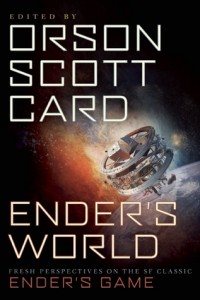 What should literary criticism accomplish? At different times, critics have focused on the literary structure of texts, examined their social impact in historical context, and probed into their moral, existential, and religious implications. The writers, teachers, and military strategists who contributed to Ender’s World: Fresh Perspectives on the SF Classic Ender’s Game have done all that work in an engaging, accessible way.
What should literary criticism accomplish? At different times, critics have focused on the literary structure of texts, examined their social impact in historical context, and probed into their moral, existential, and religious implications. The writers, teachers, and military strategists who contributed to Ender’s World: Fresh Perspectives on the SF Classic Ender’s Game have done all that work in an engaging, accessible way.
Whether studying writing craft from Mary Robinette Kowal and Eric James Stone, reflecting on life with Neal Shusterman and Matt Nix, or exploring the resonance of the text for the military with Tom Ruby and John F. Schmitt, readers will get a better sense for how novels can work—and how they can matter.
The Association for Mormon Letters is pleased to honor editor Orson Scott Card and the fifteen contributing writers for this superb and useful work of criticism.
Finalists:
“Of Many Hearts and Many Minds: The Mormon Novel and the Post-Utopian Challenge of Assimilation,” by Scott Hales. Dissertation, University of Cincinnati
“Toward a Mormon Literary Theory”. By Jack Harrell. BYU Studies Quarterly 53.3, 2014
Drama: Pride and Prejudice, by Melissa Leilani Larsen
The winner of this year’s award is no stranger to the AML. For years her award-winning work has been delighting, inspiring, and provoking Mormon audiences across the country. In 2009, her play Little Happy Secrets received the AML Drama award and since then, she has continued to write plays that are about and for Mormon audiences. This year, Melissa Leilani Larson had two of her plays as finalists for the AML Drama Award—both The Weaver of Raveloe, a musical for which she co-wrote the book to accompany Erica Glenn’s songs and music AND her own adaptation of Jane Austen’s Pride and Prejudice.
Pride and Prejudice was Mel’s first commission. This adaptation celebrating the 200th anniversary of the publication of book was commissioned by Brigham Young University and enjoyed a sold-out and extended run in Brigham Young University’s Pardoe Theatre.
With her translation of Jane Austen’s Pride and Prejudice, Mel has tapped into the cultural Mormon affinity for female nineteenth century authors. Her succinct adaption makes it accessible to a broad theatre audience, and her intuitive understanding of Austen’s wit and skillful dramaturgy have led to one of the most entertaining works by a Mormon playwright to date. We honor her work and look forward to many great plays from her in the future.
Finalists:
The Weaver of Raveloe, by Erika Glenn and Melissa Leilani Larsen
Single Wide, by George Nelson and Jordan Kamalu
Evening Eucalyptus, by Mahonri Stewart
Film: Saints & Soldiers: The Void. Ryan Little, director
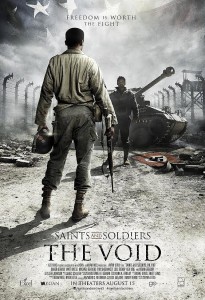 Film sequels have traditionally tended to be quick cash-grabs to capitalize on previous successes without expending much creative energy. The Void is writer/director Ryan Little’s third entry in his loosely connected Saints & Soldiers film series, but shows he has higher ambitions in mind than simply reusing leftover World War II uniforms and props. The main character, Sgt. Jesse Owens (K. Danor Gerald) was the proud leader of an all-black army battalion on the European Front, but loses his position due to racist and apathetic superiors. Now stuck driving a vehicle amidst white soldiers who don’t like having “his kind” around, Owens gets another opportunity to prove himself after a German Panzer team attacks his convoy. Can Owens and an outmanned tank crew defeat the opposition before the US supply lines are overrun?
Film sequels have traditionally tended to be quick cash-grabs to capitalize on previous successes without expending much creative energy. The Void is writer/director Ryan Little’s third entry in his loosely connected Saints & Soldiers film series, but shows he has higher ambitions in mind than simply reusing leftover World War II uniforms and props. The main character, Sgt. Jesse Owens (K. Danor Gerald) was the proud leader of an all-black army battalion on the European Front, but loses his position due to racist and apathetic superiors. Now stuck driving a vehicle amidst white soldiers who don’t like having “his kind” around, Owens gets another opportunity to prove himself after a German Panzer team attacks his convoy. Can Owens and an outmanned tank crew defeat the opposition before the US supply lines are overrun?
By taking on the weightier issue of racism within the US Army, Little upends the popular and simplistic “Us versus Them”, “Good versus Evil” view of World War II. There are some deep ironies in play as Owens risks his life fighting the supposed true “race haters” of the world (the Germans) while struggling against the institutional racism in his own organization. In addition to the emotional drama about race and brotherhood, Little also provides some thrilling tank action that makes The Void distinctive from the previous Saints & Soldiers films. With The Void, Little has successfully overcome “sequel-itis” in creating an important film that’s worthy of the Saints & Soldiers name.
Finalists:
Inspired Guns. Adam White, director
The Last Straw. Rob Diamond, director
Meet The Mormons. Blair Treu, director
Mitt. Greg Whiteley, director
Middle Grade Novel: The Scandalous Sisterhood of Prickwillow Place, by Julie Berry. MacMillian
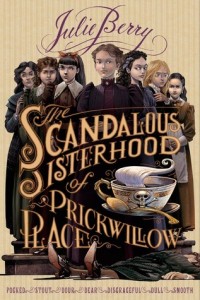 Julie Berry’s The Scandalous Sisterhood of Prickwillow Place is a madcap romp of a novel, in the best style of P.G. Wodehouse–a delightful mix of mystery, manners, clever girl heroines, and humor. The seven girls at Prickwillow Place, a staid and conventional boarding school, are alarmed, horrified and interested (depending on the girl), when their mistress and her brother drop dead at the dinner table. But rather than be sent home to their individually grim houses, the girls decide to hide the bodies and carry on as usual at the school. Of course, covering up the deaths in the midst of a small, nosy town, while also trying to solve a murder isn’t easy in the best of times, but Berry makes the process entirely worthwhile. The seven girls each have distinct personalities, and if they are not all witty, the book decidedly is.
Julie Berry’s The Scandalous Sisterhood of Prickwillow Place is a madcap romp of a novel, in the best style of P.G. Wodehouse–a delightful mix of mystery, manners, clever girl heroines, and humor. The seven girls at Prickwillow Place, a staid and conventional boarding school, are alarmed, horrified and interested (depending on the girl), when their mistress and her brother drop dead at the dinner table. But rather than be sent home to their individually grim houses, the girls decide to hide the bodies and carry on as usual at the school. Of course, covering up the deaths in the midst of a small, nosy town, while also trying to solve a murder isn’t easy in the best of times, but Berry makes the process entirely worthwhile. The seven girls each have distinct personalities, and if they are not all witty, the book decidedly is.
Honorable Mention: The End or Something Like That, by Ann Dee Ellis. Dial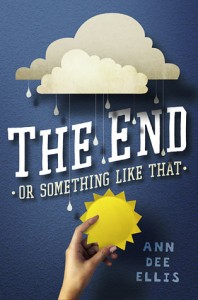
Finalists:
Almost Super, by Marion Jensen. Harper Collins
Time of the Fireflies, by Kimberley Griffiths Little. Scholastic
Sky Raiders, by Brandon Mull. Aladdin
Novel: City of Brick and Shadow, by Tim Wirkus. Tyrus Books
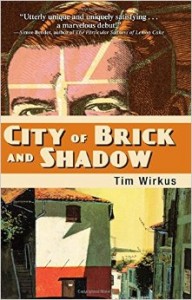 2014 was an exceptionally strong year for the Mormon novel. Works like A Song for Issy Bradley and The Bishop’s Wife won praise from Mormon and non-Mormon readers alike, while Brandon Sanderson’s fantasy epic Words of Radiance topped the best seller lists. This year’s winner, by contrast, appeared without much fanfare late in the year. Its author was new even to most of those who follow Mormon literature closely.
2014 was an exceptionally strong year for the Mormon novel. Works like A Song for Issy Bradley and The Bishop’s Wife won praise from Mormon and non-Mormon readers alike, while Brandon Sanderson’s fantasy epic Words of Radiance topped the best seller lists. This year’s winner, by contrast, appeared without much fanfare late in the year. Its author was new even to most of those who follow Mormon literature closely.
Despite its unassuming debut, City of Brick and Shadows has proved itself an important contribution to Mormon letters. If Herman Melville and Jorge Luis Borges had followed two missionaries through the Brazilian underworld, they could hardly have told the story better than Tim Wirkus. Richly intertextual, this mystery is able to participate in its genre without being wholly of it. A landmark work that offers us a glimpse of the untapped potential the Mormon novel, City of Brick and Shadows is our choice for the 2014 Novel Award.
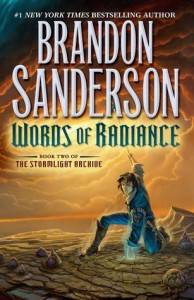 Honorable Mention: Words of Radiance, by Brandon Sanderson. Tor
Honorable Mention: Words of Radiance, by Brandon Sanderson. Tor
We would also like to issue an honorable mention for Brandon Sanderson’s Words of Radiance. This second installment in the Stormlight Archive leaves us thirsty for more, and marks another high point for Mormon writers layering sophisticated spiritual ideas into the very nature of the worlds their characters inhabit.
Finalists:
A Song for Issy Bradley, by Carys Bray. Ballantine
The Bishop’s Wife, by Mette Ivie Harrison. Soho Crime
The Thieves of Summer, by Linda Sillitoe. Signature Books
Picture Book: Girls Who Choose God: Stories of Courageous Women from the Bible, by McArthur Krishna and Bethany Brady Spalding, illustrated by Kathleen Peterson. Deseret Book Company
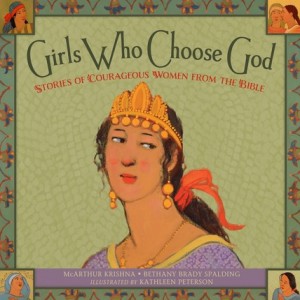 Many writers would love to influence our world, but it’s likely that few do as directly as those who write for children. McArthur Krishna and Bethany Brady Spaulding’s Girls Who Chose God is an important addition to the LDS picture book canon. Without moralizing, the book shares scriptural-based stories of women who chose God in various aspects of their lives. Given the current discussions about how to make women’s work more visible in the LDS church, this book offers an important resource for parents to talk to their children about women in the church. Kathleen Peterson’s vivid illustrations add a lovely dimension to the stories shared.
Many writers would love to influence our world, but it’s likely that few do as directly as those who write for children. McArthur Krishna and Bethany Brady Spaulding’s Girls Who Chose God is an important addition to the LDS picture book canon. Without moralizing, the book shares scriptural-based stories of women who chose God in various aspects of their lives. Given the current discussions about how to make women’s work more visible in the LDS church, this book offers an important resource for parents to talk to their children about women in the church. Kathleen Peterson’s vivid illustrations add a lovely dimension to the stories shared.
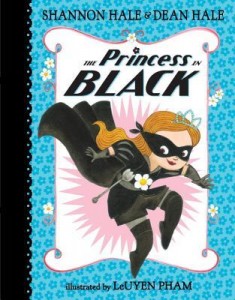 Honorable Mention: The Princess in Black, by Shannon Hale and Dean Hale, illustrated by LeUyen Pham. Candlewick Press.
Honorable Mention: The Princess in Black, by Shannon Hale and Dean Hale, illustrated by LeUyen Pham. Candlewick Press.
At the same, time our judges’ secret street-fighting alter-egos have lobbied hard for The Princess in Black. We’d like to recognize this sneakily charming work with an honorable mention.
Finalists:
Fetch, by Adam Glendon Sidwell, illustrated by Edwin Rhemrev. Future House Publishing
The World According to Musk Ox, by Erin Cabatingan, illustrated by Matthew Myers. Roaring Book Press
The Tooth Fairy Wars, by Kate Coombs, illustrated by Jake Parker. Atheneum Books
Poetry (2013): sonosuono, by Alex Caldiero. Elik Press
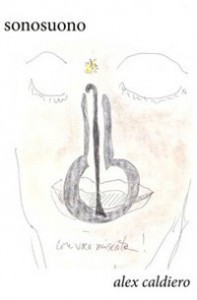 Con voce miscato: with voice mixed. So Alex Caldiero hears the world and so he speaks the world: as a dynamic gathering of voices that constitute an adaptive, interdependent whole. The Sicilian phrase appears on the cover of sonosuono, Caldiero’s stunning collection of autobiographical poetry and prose poems. The book begins with an invocation, a dual-language proem (which could mean prayer-poem or prologue-poem—or both) that poses the collection’s main concerns:
Con voce miscato: with voice mixed. So Alex Caldiero hears the world and so he speaks the world: as a dynamic gathering of voices that constitute an adaptive, interdependent whole. The Sicilian phrase appears on the cover of sonosuono, Caldiero’s stunning collection of autobiographical poetry and prose poems. The book begins with an invocation, a dual-language proem (which could mean prayer-poem or prologue-poem—or both) that poses the collection’s main concerns:
Because I don’t hope to return again
to my beloved land,
little book, go yourself
into that forsaken house
and open a window
to let in the fresh air.
Given first in Sicilian (a dying language), then in American-English, this pathos-filled supplication not only opens the way for the poet to breathe new life into the “forsaken house” of his memories and lost relationships, but it also welcomes the many voices from his past into our shared present.
Turning with longing and compassion to his past, he writes about his sensuous childhood in Sicily, running from home to church to vineyard to home; about being in the presence of death and loss; about his grandparents, his parents, his aunts and uncles; about his immigration to America; about wrestling with a new language then learning to love language—how it feels on the tongue and forges connections with others and the world; about seeking to preserve Sicilian, which he learned while drinking his mother’s milk and which as such became “part of [his] bone and marrow”; about being touched by Mormonism and reaching to unfold the divine in the everyday, especially in his most intimate relationships. sonosuono, then, is an act memory and mourning, of charity and hope that our lives and our love will endure when we’re gone. It’s a witness that the struggle to hear others and to be heard by them is worth taking on, that we can sustain, redeem, and be redeemed by our most cherished relationships if we tune our minds and our hearts to the voices whispering from the dust of our lives.
Finalists:
Salt, by Susan Elizabeth Howe. Signature Books
Genius Loci, by Lance Larsen. University of Tampa Press
Poetry (2014): Picture Dictionary, by Kristen Eliason. Flaming Giblet Press
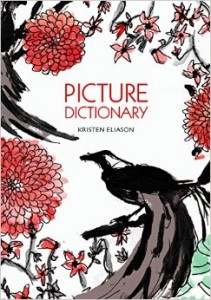 Kristen Eliason takes a big risk with Picture Dictionary, her first full-length poetry collection. Although excerpts from it have appeared elsewhere, the book isn’t a typical gathering of previously published poems; rather, as the title suggests, it consists of dictionary-like entries that pair images and text. Her entries define the interconnected series of figures (and their derivatives) that make up a phonetic Japanese syllabary called a katakana. These figures, she notes at the beginning of the book, are “used for writing foreign words or documents.” That the syllabary represents an effort to translate foreign concepts across cultures supports Picture Dictionary’s piecemeal account of the poet’s year spent abroad in Japan as well as its underlying, disarticulated narrative of deep loss and suffering, conditions that aren’t foreign to human experience but that don’t translate well into the ordered structures of language and reason. In this light, “define” is a loose term for what Eliason does with the katakana because she doesn’t so much set forth their meaning. Like Joseph Smith with his head in a hat using seer stones to translate heaven’s mysteries into human language, she peers into the void left in her world after her fiancé’s accidental death and uses these Japanese figures to invoke memories, to give shape to her desire and pain, to translate her loss into a new tongue—and so to contain sorrow without dismissing it.
Kristen Eliason takes a big risk with Picture Dictionary, her first full-length poetry collection. Although excerpts from it have appeared elsewhere, the book isn’t a typical gathering of previously published poems; rather, as the title suggests, it consists of dictionary-like entries that pair images and text. Her entries define the interconnected series of figures (and their derivatives) that make up a phonetic Japanese syllabary called a katakana. These figures, she notes at the beginning of the book, are “used for writing foreign words or documents.” That the syllabary represents an effort to translate foreign concepts across cultures supports Picture Dictionary’s piecemeal account of the poet’s year spent abroad in Japan as well as its underlying, disarticulated narrative of deep loss and suffering, conditions that aren’t foreign to human experience but that don’t translate well into the ordered structures of language and reason. In this light, “define” is a loose term for what Eliason does with the katakana because she doesn’t so much set forth their meaning. Like Joseph Smith with his head in a hat using seer stones to translate heaven’s mysteries into human language, she peers into the void left in her world after her fiancé’s accidental death and uses these Japanese figures to invoke memories, to give shape to her desire and pain, to translate her loss into a new tongue—and so to contain sorrow without dismissing it.
Picture Dictionary’s unconventional form challenges readers to think differently about conventional modes of mourning and grief and to reconsider how we translate loss into everyday living beyond the abiding question, “How can I go on?” Coming from a less graceful poet, the answer might be just to ignore the messy recursions of mourning through which grief repeatedly turns back on itself and threatens us with erasure. But at Eliason’s hands, the answer is to breathe grief in, to let it (like the breath of life) fill the soul, then to sing the alphabet: to go back to the beginning and relearn how each letter—each expression of desire—feels coming from the mouth and how each combines with others to make the words we use to hold what we love even when what we love has passed out of reach.
Finalists:
Uncommon Prayer and Made Flesh: Sacrament and Poetics in Post-Reformation England, by Kimberly Johnson. Persea Press and University of Pennsylvania Press
In the Museum of Coming and Going, by Laura Stott. New Issues Poetry Press
Religious Non-Fiction: Re-Reading Job: Understanding the Ancient World’s Greatest Poem, by Michael Austin. Greg Kofford Books
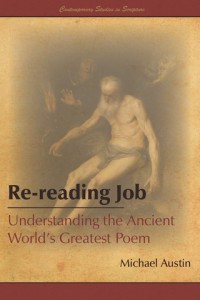 Amongst those with the both desire and the ability to go beyond the LDS Church’s correlated Sunday School curricula and dive deeper into the scriptures, there is probably no greater sense of disconnect and frustration with any particular piece of writing in the whole standard works than with the Book of Job. It is a difficult work, both in terms of its literary genesis and construction (an ancient poem, placed in the context of an even more ancient folk tale, with numerous interpretive interventions along the way), and in terms of what faithful Mormons (with our legacy of, whatever the 8th Article of Faith may say, reading the Bible both literally and in terms of supposedly unifying Christian message) are to do with it. It’s no wonder that Elder Bruce R. McConkie, in the course of long sermon which insightfully discussed the various messages of the many different parts of the Bible, dealt with it in a single curt sentence: “The Book of Job is for people who like the Book of Job.”
Amongst those with the both desire and the ability to go beyond the LDS Church’s correlated Sunday School curricula and dive deeper into the scriptures, there is probably no greater sense of disconnect and frustration with any particular piece of writing in the whole standard works than with the Book of Job. It is a difficult work, both in terms of its literary genesis and construction (an ancient poem, placed in the context of an even more ancient folk tale, with numerous interpretive interventions along the way), and in terms of what faithful Mormons (with our legacy of, whatever the 8th Article of Faith may say, reading the Bible both literally and in terms of supposedly unifying Christian message) are to do with it. It’s no wonder that Elder Bruce R. McConkie, in the course of long sermon which insightfully discussed the various messages of the many different parts of the Bible, dealt with it in a single curt sentence: “The Book of Job is for people who like the Book of Job.”
Thanks to Michael Austin, the number of faithful Mormons who may be included with those “who like the Book of Job” is bound to increase. Austin is not a Hebrew scholar, but rather a scholar of literature, skilled in the ways in which the stories we tell evolve and become meaningful in our lives. In Re-Reading Job, he makes use of those skills to artfully survey and weave together the best historical and cultural scholarship on the Book of Job, and present it in ways which thoroughly—though never mean-spiritedly—deconstruct the assumptions which have too often limited our church’s correlated approach to this powerful work of literature. But this short and entertainingly written book not only deconstructs, but also celebrates. Austin is a late convert to what many millions of readers have discovered over the millennia: that the ancient story-teller(s) behind the Book of Job had a thoughtful, challenging, and in many ways inspiring message, one that 21st century Mormons can learn from every bit as much as the Deuteronomist audiences of old did. In a series of compact, constructive chapters, Austin walks us through the theological and literary merits of Job’s frame tale, the various ideas presented in its long poetic center, the connections those ideas have with other Biblical traditions, the ethical lessons which can be drawn from the whole story, and much more. For this accomplishment on behalf of so many Mormon readers who will benefit from having their eyes opened to, we award Re-Reading Job the Association for Mormon Letters Religious Non-Fiction Award for 2015.
Finalists:
Seeking the Promised Land, by David E. Campbell, John C. Green, and J. Quin Monson. Cambridge University Press
Wresting the Angel, by Terryl Givens. Oxford University Press
Short Fiction (2013): “The Chaplain’s Legacy” by Brad R. Torgersen. Analog Science Fiction and Fact, July/August 2013
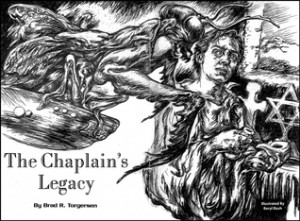 In “The Chaplain’s Legacy”, readers are introduced to Harrison Barlow, a reluctant military officer and inadvertent religious advisor who is surprised to find himself playing a pivotal role in the survival of the human species. While in many ways this story is a classic science fiction tale of humans versus aliens, replete with interplanetary politics and battle scenes, Torgersen does much more than spin a good tale. The future he imagines, and the aliens who inhabit this future, are believable and original. He treats the alien race as more than an army of grotesque invaders to be conquered but as a compelling culture in its own right. The story also wrestles with questions of faith, exploring both the possibilities and the consequences of attempting religious understanding between two cultures at war. Each character’s wrestle with the Other–the religious Other, the alien Other–is complex and sympathetic, provoking a similar wrestle inside the reader. The story has been expanded into the novel The Chaplain’s War (Baen, 2014). The Association for Mormon Letters is proud to present its 2013 award for short fiction to Brad R. Torgerson for this satisfying and thought-provoking story.
In “The Chaplain’s Legacy”, readers are introduced to Harrison Barlow, a reluctant military officer and inadvertent religious advisor who is surprised to find himself playing a pivotal role in the survival of the human species. While in many ways this story is a classic science fiction tale of humans versus aliens, replete with interplanetary politics and battle scenes, Torgersen does much more than spin a good tale. The future he imagines, and the aliens who inhabit this future, are believable and original. He treats the alien race as more than an army of grotesque invaders to be conquered but as a compelling culture in its own right. The story also wrestles with questions of faith, exploring both the possibilities and the consequences of attempting religious understanding between two cultures at war. Each character’s wrestle with the Other–the religious Other, the alien Other–is complex and sympathetic, provoking a similar wrestle inside the reader. The story has been expanded into the novel The Chaplain’s War (Baen, 2014). The Association for Mormon Letters is proud to present its 2013 award for short fiction to Brad R. Torgerson for this satisfying and thought-provoking story.
Finalists:
“The Righteous Road” by Ryan Shoemaker from Silk Road Review, Summer/Fall 2013
“Expiation” by Richard Dutcher from Sunstone #171, July 2013
“Duplex” by Eric Freeze from Prairie Fire 34.1, Spring 2013
“The Gift of Tongues” by Annette Haws from Dialogue: A Journal of Mormon Thought, Winter 2013
Short Fiction (2014): “Two-Dog Dose” by Steven L. Peck from Dialogue: A Journal of Mormon Thought, Spring 2014
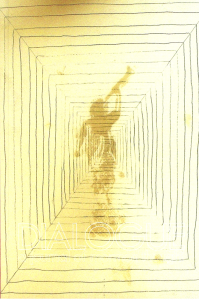 In “Two-Dog Dose,” Steven L. Peck explores the meaning of empathy and loyalty through a wrenching moral dilemma. Lorin and Karl have been friends since their days as roommates at BYU. Now, in their old age, Karl is on the brink of losing himself in the fog of dementia and informs his friend that he’s “invoking the pact”—a pact that will require Lorin to decide if the strength of his word and the power of his friendship is enough to endure the horror of helping his best friend die. Through beautiful language and obvious affection for landscape, Peck describes a friendship that has endured over decades, and despite differences of belief. There is pain here in Peck’s unflinching portrayal of a desperate situation: we feel it; we believe it. And, through a beautifully symbolic and cathartic baptism near the story’s end, we emerge changed from having vicariously lived through it. Peck’s “Two-Dog Dose” represents the very best of Mormon storytelling, and the Association for Mormon Letters is pleased to honor it with the 2014 award for short fiction.
In “Two-Dog Dose,” Steven L. Peck explores the meaning of empathy and loyalty through a wrenching moral dilemma. Lorin and Karl have been friends since their days as roommates at BYU. Now, in their old age, Karl is on the brink of losing himself in the fog of dementia and informs his friend that he’s “invoking the pact”—a pact that will require Lorin to decide if the strength of his word and the power of his friendship is enough to endure the horror of helping his best friend die. Through beautiful language and obvious affection for landscape, Peck describes a friendship that has endured over decades, and despite differences of belief. There is pain here in Peck’s unflinching portrayal of a desperate situation: we feel it; we believe it. And, through a beautifully symbolic and cathartic baptism near the story’s end, we emerge changed from having vicariously lived through it. Peck’s “Two-Dog Dose” represents the very best of Mormon storytelling, and the Association for Mormon Letters is pleased to honor it with the 2014 award for short fiction.
Finalists:
“Recollection” by Nancy Fulda from Carbide Tipped Pens. TOR: Dec. 2014
“Anatomy” by Tim Wirkus from Weird Fiction Review, June 2014
“Jesus Enough” by Levi S. Peterson from Dialogue: A Journal of Mormon Thought, Winter 2014
Young Adult General Novel: Death Coming Up the Hill, by Chris Crowe. Houghton Mifflin
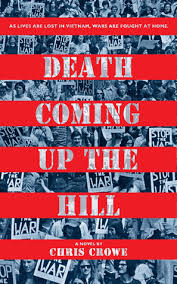 Death Coming Up The Hill has the potential to be gimmicky: after all, it’s written entirely in haiku (976 stanzas–one syllable for each of them 16,592 American soldiers who died in Vietnam), it deals with a boy coming of age in 1968, at the height of the Vietnam war, and his parent’s imploding marriage. Surprisingly, despite the format, the book is compulsively readable. The haiku is almost effortless as it weaves the story of Ashe’s life, his obsession with the mountain casualties in Vietnam, his crowing relationship with his girlfriend, and the truce he tries to negotiate between his parents, an unlikely couple who married only because he was on the way. Crowe deals with heavy topics–death, war, and racism–but the novel itself never feels heavy. Instead, it’s thought-provoking and moving, the prose is both elegant and spare, and Ashe is a fascinating, well-drawn character.
Death Coming Up The Hill has the potential to be gimmicky: after all, it’s written entirely in haiku (976 stanzas–one syllable for each of them 16,592 American soldiers who died in Vietnam), it deals with a boy coming of age in 1968, at the height of the Vietnam war, and his parent’s imploding marriage. Surprisingly, despite the format, the book is compulsively readable. The haiku is almost effortless as it weaves the story of Ashe’s life, his obsession with the mountain casualties in Vietnam, his crowing relationship with his girlfriend, and the truce he tries to negotiate between his parents, an unlikely couple who married only because he was on the way. Crowe deals with heavy topics–death, war, and racism–but the novel itself never feels heavy. Instead, it’s thought-provoking and moving, the prose is both elegant and spare, and Ashe is a fascinating, well-drawn character.
1968
A year when the world implodes
And a boy grows up
Tell the story, Crowe
Make ev’ry syllable count
the cost of our choice
Make death the backdrop
Yes, death coming up the hill
And show us a truth
AML has found
Its YA General Novel
For 2014
Finalists:
Forbidden, by Kimberley Griffiths Little. Harper Collins
On the Fence, by Kasie West. Harper Collins
Signed, Skye Harper, by Carol Lynch Williams. Paula Wiseman Books
Stronger than You Know, by Jolene Perry. Albert Whiteman Teen
Young Adult Speculative Novel: Atlantia, by Ally Condie. Penguin/Dutton
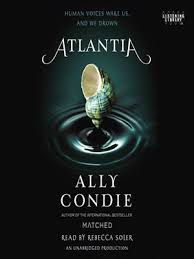 Ally Condie’s Atlantia is a quiet, restrained beauty of a novel. The story follows Rio Conwys, a twin who struggles with being left in Atlantia, an underwater world, while her twin sister chooses to live above. As Rio struggles through loneliness, she begins to unravel the secrets surrounding her mother’s death, which in turn reveals secrets about the politics of Above and Below that threaten everything Rio understands about her world. But despite the politics and twists of the plot, ultimately the story is about Rio’s coming to voice–both claiming the power of her Siren voice, which she has kept hidden, and about coming to understand what it is she values. And while there is a romance in the story, the real relationship is about sisters: about Rio and Bay and the complicated and powerful bond that sisters share. In Atlantia, Condie has succeeded in creating a world that is both beautiful and dangerous, weaving a quietly moving story in clear, flowing prose.
Ally Condie’s Atlantia is a quiet, restrained beauty of a novel. The story follows Rio Conwys, a twin who struggles with being left in Atlantia, an underwater world, while her twin sister chooses to live above. As Rio struggles through loneliness, she begins to unravel the secrets surrounding her mother’s death, which in turn reveals secrets about the politics of Above and Below that threaten everything Rio understands about her world. But despite the politics and twists of the plot, ultimately the story is about Rio’s coming to voice–both claiming the power of her Siren voice, which she has kept hidden, and about coming to understand what it is she values. And while there is a romance in the story, the real relationship is about sisters: about Rio and Bay and the complicated and powerful bond that sisters share. In Atlantia, Condie has succeeded in creating a world that is both beautiful and dangerous, weaving a quietly moving story in clear, flowing prose.
Finalists:
The Paper Magician, by Charlie Holmberg. 47North/Amazon
The Unhappening of Genesis Lee, by Shallee McArthur. Sky Pony Press
Son of War, Daughter of Chaos, by Janette Rallison. Self
Ruins, by Dan Wells. Harper Collins
Illusions of Fate, by Kiersten White. Harper Collins

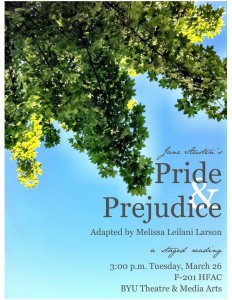
Congratulations everybody. I wish I could have been there to celebrate with you all in person.
Here in the simple list:
2014 Smith-Pettit Foundation Award for Outstanding Contribution to Mormon Letters
Margaret Blair Young
AML Honorary Lifetime Membership
Karen Rosenbaum
AML Honorary Lifetime Membership
Lance Larsen
2014 AML Award for Comics to Stephen Carter and Jett Atwood for iPlates: Volume II
2014 AML Award for Creative Non-Fiction to Eric Freeze for Hemingway on a Bike
2014 AML Award for Criticism to Orson Scott Card, et al for Ender’s World: Fresh Perspectives on the SF Classic Ender’s Game
2014 AML Award for Drama to Melissa Leilani Larson for Pride and Prejudice
2014 AML Award for Film to Saints and Soldiers: The Void, Ryan Little, director.
2014 AML Award for Middle Grade Novel to Julie Berry for The Scandalous Sisterhood of Prickwillow Place
Middle Grade Novel Honorable Mention: Ann Dee Ellis
for The End or Something Like That
2014 AML Award for Novel to Tim Wirkus for City of Brick and Shadow
Novel Honorable Mention: Brandon Sanderson for Worlds of Radiance
2014 AML Award for Picture Book to McArthur Krishna, Bethany Brady Spalding, and Kathleen Peterson for Girls Who Choose God
Picture Book Honorable Mention: Shannon Hale, Dean Hale, and LeUyen Pham
for Princess in Black
2013 AML Award for Poetry to Alex Caldiero for sonosuono
2014 AML Award for Poetry to Kristen Eliason for Picture Dictionary
2014 AML Award for Religious Non-Fiction to Michal Austin for Re-Reading Job
2013 AML Award for Short Fiction to Brad R. Torgersen for “The Chaplain’s Legacy”
2014 AML Award for Short Fiction to Steven L. Peck for “Two-Dog Dose”
2014 AML Award for Young Adult General Novel to Chris Crowe for Death Coming Up the Hill
2014 AML Award for Young Adult Speculative Novel to Ally Condie for Atlantia
I really wish I could have been there. Sounds fantastic and thank you James and everyone else who planned, organized and executed this event. Thanks for keeping the flame alive.